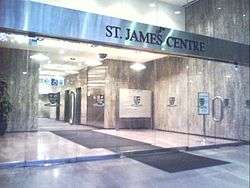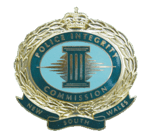Police Integrity Commission
| Police Integrity Commission | |
|---|---|
| Abbreviation | PIC |
|
Crest of the PIC | |
| Agency overview | |
| Formed | 1 July 1996 |
| Legal personality | Governmental: Government agency |
| Jurisdictional structure | |
| Operations jurisdiction* | State of New South Wales, Australia |
| Constituting instrument | Police Integrity Act 1996 (NSW) |
| General nature |
|
| Specialist jurisdiction | Anti corruption. |
| Operational structure | |
| Overviewed by Inspectorate and parliamentary committee | Inspector of the Police Integrity Commission and Parliamentary Joint Committee on the Ombudsman, the Police Integrity Commission and the Crime Commission |
| Headquarters | St. James Centre, Level 3, 111 Elizabeth Street, Sydney, NSW 2000, Australia |
| Minister responsible | Hon. Mike Baird MP, Premier of New South Wales |
| Agency executive | Bruce James QC, Commissioner |
| Website | |
|
www | |
| Footnotes | |
| * Divisional agency: Division of the country, over which the agency has usual operational jurisdiction. | |
The Police Integrity Commission, a statutory corporation of the New South Wales Government, is responsible for the prevention, detection, and investigation of alleged serious misconduct in the Police Force in the state of New South Wales, Australia.
The Commission was established on 1 July 1996 pursuant to the Police Integrity Act 1996 (NSW) following the Wood Royal Commission into the New South Wales Police Service.
The Commission is led by a Commissioner, presently Bruce James QC. The Commission previously reported to the Minister for Police and Emergency Services, however since 2011 it has reported to the Premier of New South Wales, presently the Honourable Mike Baird MP. An independent Inspector of the Police Integrity Commission provides oversight of the operational functions of the Commission.
History
The Commission was set up following a recommendation by the Royal Commission into the New South Wales Police Service. That recommendation, among others, led to a radical transformation of the police service in New South Wales. The Commission can be seen as the successor to the Royal Commission, although the Commission's powers and duties are far more extensive than those granted to the Royal Commission.
The Commission looks into serious police misconduct and can refuse to investigate. There is no other body or Commission that looks into police misconduct except for the NSW Ombudsman. However, the Ombudsman, as a matter of procedure, will refer any complaints made about police or unsatisfactory police investigations back to the area command or the investigating officer.
On 26 November 2015 Police Minister Troy Grant announced that the PIC would be replaced by a new body, the Law Enforcement Conduct Commission.[1] On 8 November 2016 legislation was passed by the NSW Parliament to establish the Commission.[2]
Constitution
The Commission is established under the Police Integrity Act 1996 (NSW). The act sets out the principal functions of the Commission. They include:
- preventing, detecting or investigating serious police misconduct;
- managing or overseeing other agencies in the detection and investigation of serious police misconduct and other police misconduct; and
- manage matters not completed by the Royal Commission into the New South Wales Police Service.
The Commission employs a variety of experienced staff including lawyers, accountants, police, investigators and analysts. Where police officers are employed, they are employed from overseas or interstate.
The Commission has extensive powers to summons witnesses and require the production of documents by third parties in relation to an investigation. The Commissioner may issue a warrant for the arrest of a witness who does not appear in answer to a summons. The Commissioner may direct that a prisoner be brought out of prison to be examined. The Commission may also issue search warrants to search and seize property.
Hearings

The Commission may conduct public or private hearings depending on the nature of the allegations. A hearing may be partly heard in private and partly in public.
The Commissioner has the discretion to allow persons to appear and take part in a hearing. There is no automatic right of appearance.
Similarly, the Commissioner may allow a person to be legally represented. Generally, the Commission must give a person giving evidence the opportunity to be legally represented.
Address
St James Centre Level 3, 111 Elizabeth Street, SYDNEY NSW 2000
Telephone: (02) 9321 6700 Fax: (02) 9321 6799
Postal Address: GPO BOX 3880, SYDNEY NSW 2001
Parliamentary Joint Committee
The Committee on the Ombudsman, the Police Integrity Commission and the Crime Commission[3] is a current joint statutory committee of the Parliament of New South Wales that was established on 4 December 1990, and re-established 22 June 2011, that has a statutory oversight over the Commission. This oversight includes monitoring and reviewing the exercise by the Commission and the Inspector of the Police Integrity Commission of their functions. The committee may report to both Houses of Parliament on any of those matters raised. The committee also examines each annual report and other report of the Commission and of the Inspector and report to both Houses of Parliament on any matter arising out those reports. The committee may also examine trends and changes in police corruption, and practices and methods relating to police corruption, and report to both Houses of Parliament any changes which the Joint Committee thinks desirable to the functions, structures and procedures of the Commission and the Inspector. Lastly, the committee may inquire into any question in connection with its functions which is referred to it by both Houses of Parliament, and report to both Houses on that question.
As of 1 April 2015, the members of the Committee were:[3]
- Hon. Catherine Cusack, MLC (Chairperson) (Liberal)
- Mr Lee Evans, MP, Member for Heathcote (Vice-Chairperson) (Liberal)
- Mr Kevin Anderson, MP, Member for Tamworth (National)
- Hon. Paul Lynch, MP, Member for Liverpool (Labor)
- Mr Ryan Park, MP, Member for Keira (Labor)
- Hon. Sarah Mitchell, MLC (National)
- Hon. Adam Searle, MLC (Labor)
Inspector of the commission
The Act provides for the appointment of an inspector of the Commission. The inspector is an independent person of the Commission has the authority to investigate complaints against the Commission. For further information, see the Inspector of the Police Integrity Commission.
See also
References
- ↑ Olding, Rachel (26 November 2015). "Police Integrity Commission scrapped in the biggest overhaul of police oversight in 20 years". The Sydney Morning Herald. Fairfax Media. Retrieved 4 December 2015.
- ↑ Kidd, Jessica (9 November 2016). "New police watchdog can't recycle other agencies' staff, NSW Police Association says". ABC News. Australian Broadcasting Corporation. Retrieved 9 November 2016.
- 1 2 "Committee on the Ombudsman, the Police Integrity Commission and the Crime Commission". Committees. Parliament of New South Wales. Retrieved 11 April 2015.

